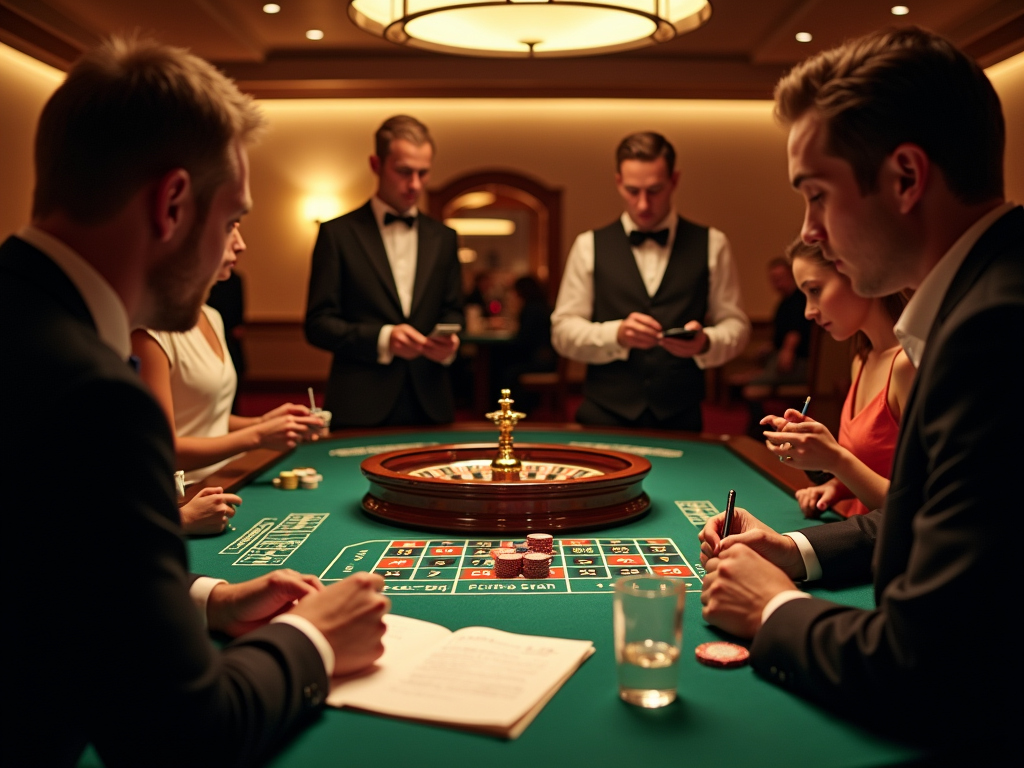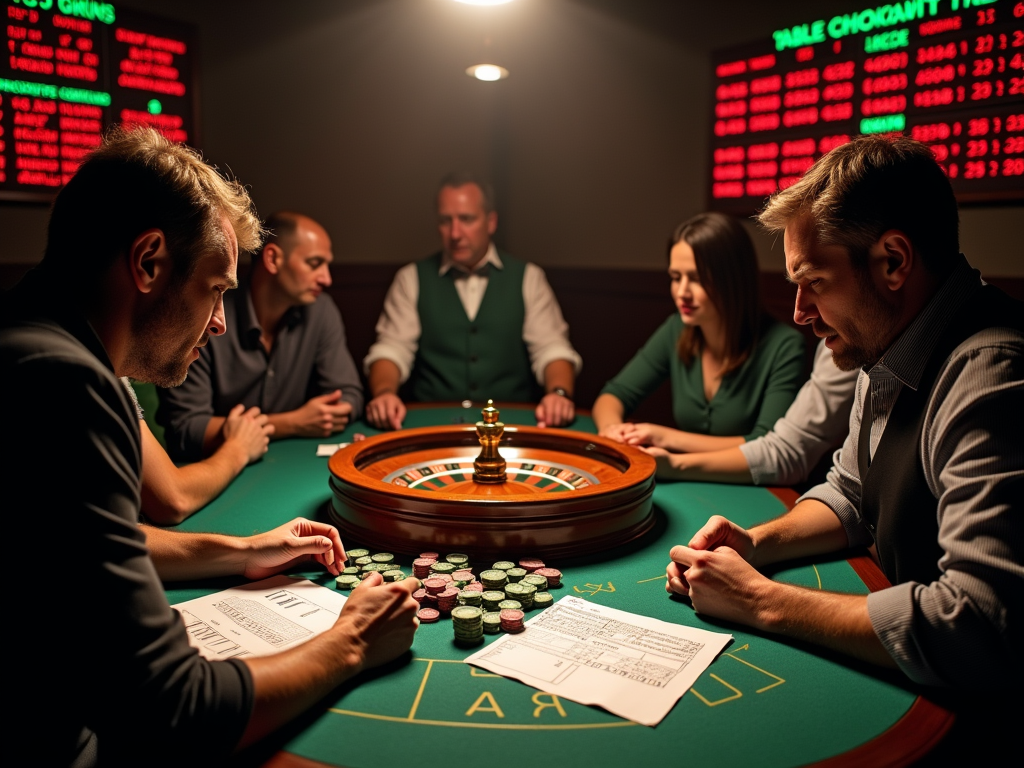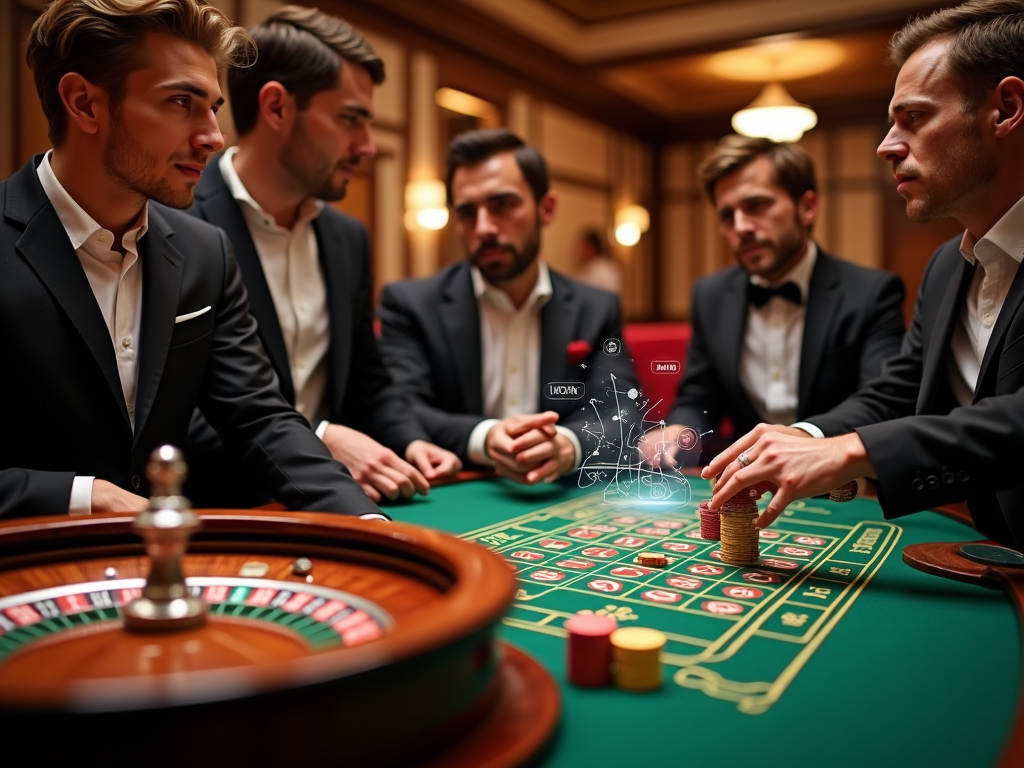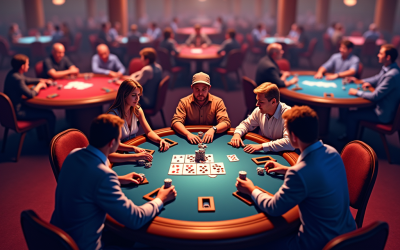The Thrill of Roulette: A Blend of Psychology and Probability
Roulette blends psychological appeal with mathematical odds, creating an exciting casino experience. The spinning wheel and bouncing ball bring instant excitement, while calculated bets add strategic depth to each round.
Key Takeaways
- The house edge varies significantly between European (2.70%) and American (5.26%) roulette, affecting long-term playing outcomes.
- Common psychological traps like the Gambler’s Fallacy and Illusion of Control can lead to poor decision-making.
- Setting strict bankroll limits and treating roulette as entertainment rather than a profit source is essential.
- Popular betting systems cannot overcome the mathematical house advantage built into the game.
- Social interaction and appreciating the game’s atmosphere contribute significantly to the overall roulette experience.
Understanding Probability and Emotional Control
I’ve found that successful roulette play requires a clear understanding of probability combined with emotional control. The game’s random nature means each spin exists independently of previous results. This fact often challenges players who search for patterns or use progressive betting systems.
Responsible Bankroll Management
Smart bankroll management forms the foundation of responsible play. I set clear limits before starting and stick to them regardless of wins or losses. This approach helps maintain the fun while preventing emotional decisions that could lead to excessive losses.
The Role of Social Interaction
The social aspect of roulette adds another layer of enjoyment. Sharing the excitement with other players, learning from experienced participants, and engaging with skilled dealers enriches the experience beyond simple betting outcomes.
Balancing Fun and Strategy
Understanding these elements creates a balanced approach to roulette that maximizes entertainment value while acknowledging the game’s built-in house edge. This perspective allows players to fully enjoy the excitement without unrealistic expectations of consistent profits.
Why House Edge Makes Roulette Fascinating Yet Predictable
I’ve found that understanding the house edge in roulette creates a unique blend of excitement and strategic thinking. The mechanics behind roulette’s mathematical structure reveal why casinos consistently profit while still offering players genuine chances to win.
The Mathematics Behind the Edge
The house edge varies significantly between European and American roulette tables. European roulette features 37 pockets with a single zero, creating a 2.70% house edge. This means for every $100 wagered, the casino expects to keep $2.70 over time. American roulette adds an extra pocket — the double zero — bringing the total to 38 pockets and pushing the house edge up to 5.26%.
The clever part lies in the payout structure. While the true odds of hitting a single number in European roulette are 36:1, the casino pays only 35:1 on winning bets. This small difference guarantees the house maintains its advantage without appearing unfair to players.
Random Outcomes and Common Misconceptions
Each spin on a roulette wheel stands alone as an independent event. Here’s what this means for your gameplay:
- Previous results don’t influence future spins
- Hot or cold numbers have equal chances on the next spin
- Betting systems can’t overcome the built-in house edge
- Both physical wheels and digital RNG systems provide random results
I’ve noticed many players fall into the trap of thinking they can predict outcomes based on past results. But just like other casino games, roulette’s randomness makes each spin fresh and unpredictable.
The beauty of roulette lies in accepting these mathematical certainties while still enjoying the thrill of the spin. Understanding the house edge doesn’t diminish the excitement — it helps set realistic expectations and makes the wins even more satisfying when they come.
The Hidden Psychology Traps Every Roulette Player Should Know
I’ve seen countless players fall into psychological traps at the roulette tables, where excitement and anticipation can cloud judgment. These mental pitfalls aren’t just common – they’re built into our brain’s wiring.
Key Cognitive Biases Affecting Roulette Players
The Gambler’s Fallacy tops the list of psychological traps. I’ve watched players bet heavily on red after seeing black come up multiple times, convinced that red “must be due.” This thinking is flawed – each spin is independent, and previous results don’t influence future outcomes.
You should watch out for these common psychological traps:
- The Illusion of Control: Thinking specific betting patterns or lucky rituals can influence random spins
- Near Miss Effect: Feeling like you “almost won” when your number was close to the winning one
- Confirmation Bias: Remembering wins more clearly than losses, creating a false sense of success
The brain plays fascinating tricks during casino games like roulette. Near-misses trigger similar neural responses to actual wins, making you feel like you’re “getting closer” to success. This response can push you to keep playing when you should step back.
I’ve noticed players developing elaborate systems based on these biases. They might track numbers, adjust bets based on patterns, or follow specific sequences – all while ignoring the fundamental randomness of each spin. These behaviors can lead to poor bankroll management decisions and emotional rather than logical betting.
The excitement of the game combines with these psychological factors to create a powerful cocktail that can override rational thinking. Each near-miss or pattern recognition triggers dopamine releases, making it harder to maintain objectivity about your actual chances of winning.
To protect yourself, set clear limits before playing and recognize these biases when they appear. Remember that feeling “due” for a win or “getting closer” to success are emotional responses, not mathematical realities. The key is enjoying the entertainment value of roulette while staying grounded in the fact that each spin stands alone, independent of all others.
Smart Ways to Set Limits and Stay in Control
Let’s be clear – roulette should be treated as entertainment, similar to catching a movie or having dinner at a nice restaurant. I’ve learned that the key to enjoying roulette’s thrilling moments while staying in control lies in setting firm boundaries from the start.
Creating Your Gaming Framework
Before sitting at the table, I recommend establishing a dedicated bankroll that comes only from your disposable income – money you can afford to lose without impacting your essential expenses. Think of it like setting aside cash for a night out – once it’s gone, it’s gone.
Here are my proven strategies for maintaining control at the roulette table:
- Set a strict loss limit before you start playing – I suggest no more than 2% of your monthly disposable income
- Use a timer on your phone to limit gaming sessions to a predetermined duration
- Take regular breaks every 30 minutes to step away and clear your head
- Never chase losses by exceeding your predetermined limits
- Keep track of your wins and losses in a simple note on your phone
Understanding variance is crucial in casino gaming. While you might get lucky and win in the short term, the house edge will always prevail over time. That’s why I compare roulette spending to other entertainment costs – if you’d spend $100 on concert tickets, that same amount could be your roulette entertainment budget.
Just like how effective bankroll management in blackjack is essential, roulette demands similar discipline. I’ve found that keeping detailed records of my gaming sessions helps maintain perspective on spending and prevents emotional decisions.
The real enjoyment comes from accepting that each spin is independent and focusing on the excitement of the moment rather than trying to predict outcomes. By setting these boundaries and sticking to them, I can fully appreciate the social atmosphere and entertainment value that roulette offers without risking my financial stability.
Think of your roulette budget like a ticket price for entertainment – once you’ve spent your allocation, the show’s over. This mindset helps maintain a healthy relationship with the game while maximizing enjoyment within your predetermined limits.
Remember that true gaming satisfaction comes from playing responsibly and within your means. By implementing these control measures, you’ll ensure that roulette remains an enjoyable pastime rather than a source of stress or financial strain.

How to Focus on Fun Instead of Just Winning
Creating an Enjoyable Roulette Experience
I’ve found that roulette’s greatest appeal lies in its excitement rather than just the potential payouts. The magical moment when the ball dances around the wheel creates genuine suspense that’s hard to match in other casino games. It’s this heart-racing anticipation that makes each spin special, regardless of the outcome.
The polished wooden wheel, the satisfying click of the ball, and the sophisticated layout of the betting table all add to roulette’s charm. These elements create an atmosphere that’s both thrilling and refined. By appreciating these details, you’ll discover a deeper connection to the game beyond simple wins and losses.
Social interaction adds another layer of enjoyment to your roulette session. Strike up conversations with other players, share in their victories, and support each other during less fortunate spins. This social aspect transforms a simple betting game into a shared adventure, making every moment more memorable.
Shifting Your Mindset
Treating wins as pleasant surprises rather than expectations helps maintain a healthy perspective. Think of it like this – if you went to see a movie, you wouldn’t measure its value solely by whether you won a free popcorn refill. The same principle applies to casino entertainment.
Consider these ways to enhance your roulette experience:
- Set entertainment-focused goals instead of purely financial ones
- Take time to appreciate the craftsmanship of the wheel and table
- Celebrate the suspense of each spin
- Chat with dealers and fellow players
- Take regular breaks to maintain excitement
- Keep track of interesting number patterns just for fun
By focusing on the process rather than the outcome, you’ll find more satisfaction in each gaming session. This approach helps prevent the frustration that can come from fixating on wins and losses. Remember, just like other casino games, roulette is primarily about entertainment.
Your mindset plays a crucial role in how much fun you’ll have at the table. Think of your betting amount as the price of admission for an evening’s entertainment. This perspective helps maintain realistic expectations while maximizing enjoyment. When you stop chasing wins and start savoring the experience, you’ll discover roulette’s true appeal lies in its ability to provide genuine entertainment value with every spin.
Common Betting Systems and Why They Don’t Work
Popular Betting Strategies
I’ve seen countless players try to beat roulette’s inherent house edge through betting systems, but these approaches consistently fall short. The Martingale system, perhaps the most famous strategy, suggests doubling your bet after each loss. This might sound logical – after all, when you finally win, you’ll recover all previous losses plus a small profit. But there’s a major catch.
The Fibonacci system follows a sequence where each bet equals the sum of your two previous wagers. The D’Alembert takes a gentler approach, increasing bets by one unit after losses and decreasing by one after wins. Meanwhile, the Labouchère system asks players to create a number sequence and cross off numbers as they win.
Why These Systems Fail
These betting systems share a fatal flaw – they can’t change the basic math of casino games. Even-money bets in European Roulette offer a 48.6% chance of winning, while American Roulette drops this to 47.4%. No amount of clever betting can improve these odds.
Here’s what makes these systems particularly risky:
- Table limits prevent unlimited progression of bets
- A string of losses can quickly deplete your bankroll
- Each spin remains completely independent
- The house edge applies to every bet, regardless of size
- Recovery attempts often lead to larger losses
Casino table limits are specifically designed to counter progression systems. Even with a generous $10,000 maximum bet, just a few consecutive losses using the Martingale system can max out your betting ability or empty your wallet. That’s why I recommend focusing on smart bankroll management instead of chasing losses with progressive betting systems.

Sources:
American Psychiatric Association – DSM-5
National Council on Problem Gambling Website
Kahneman, Daniel – Thinking, Fast and Slow
Clark, Luke – Trends in Cognitive Sciences/Neuron publications
Turner & Haluza-DeLay – Journal of Gambling Studies
Griffiths, Mark D. – Journal of Gambling Studies publications





